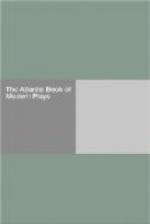The speech of the people is not difficult to understand when you master a few of its peculiarities. One is the omission of words we generally include, as in, “Isn’t it a hard and cruel man (who) won’t hear....” Another is the common form “It was crying I was.” A few phrases, like what way for how, the way for so that, in it for here or near, and itself for even, or with no particular meaning, as “Where is he itself?” The meanings of other words will be easily untangled.
William Butler Yeats: THE LAND OF HEART’S DESIRE
Mr. Yeats’s best poetic dramas, and particularly this one, represent beyond question that “apex of beauty” to which Lady Gregory spoke of the Abbey Theatre dramatists as aspiring. This play is not founded on any particular Irish folk-tale. It is filled with the half-dread, half-envy with which the tellers of Irish legends seem to regard the fate of mortals bewitched by the Leprechaun or Good People. It is rich, too, with the music of beautiful words, without which, Mr. Yeats contends no play can be “of a great kind.” He says too, “There is no poem so great that a fine speaker cannot make it greater, or that a bad ear cannot make it nothing.”
Mr. Yeats has written broad comedy like Synge’s Shadow of the Glen and Lady Gregory’s Irish Comedies; his Pot of Broth is a most clever retelling of an old, comical tale. But it is by his mystical and poetical plays that he would be judged as playwright and poet—particularly Deirdre, which should be compared with Synge’s Deirdre of the Sorrows; The Unicorn of the Stars, written in collaboration with Lady Gregory; Cathleen Ni Hoolihan, a dramatization of the spirit of Ireland; The King’s Threshold, a high glorification of the poet’s art, with a fable, based on an ancient Celtic rite, of the hunger strike; and The Land of Heart’s Desire, most beautifully perfect of all.
Gordon Bottomley: THE RIDING TO LITHEND




